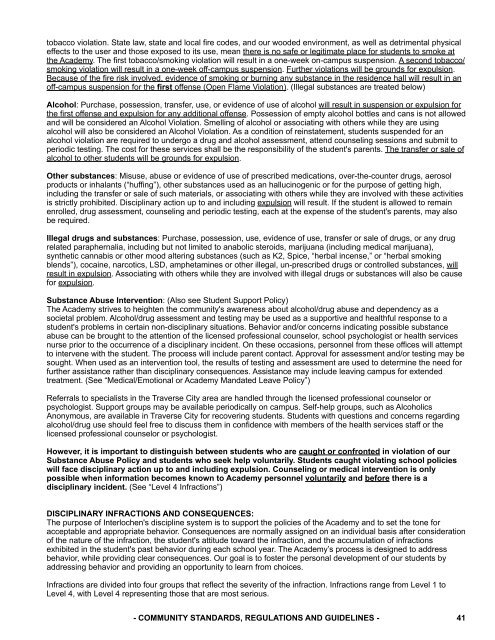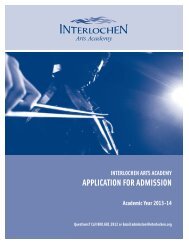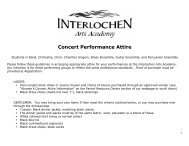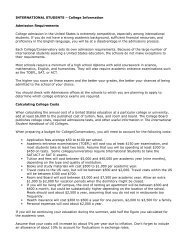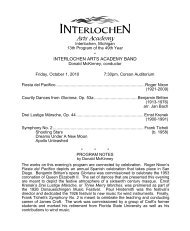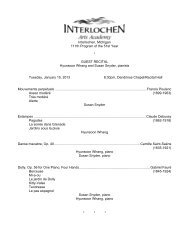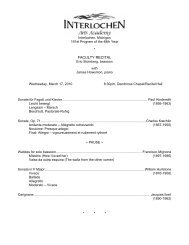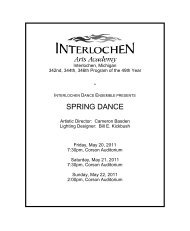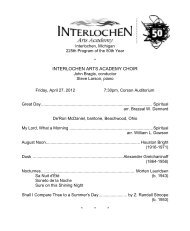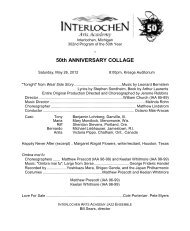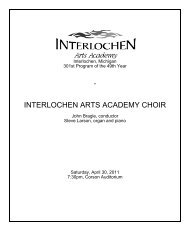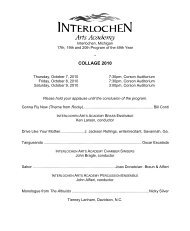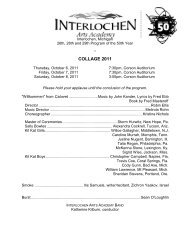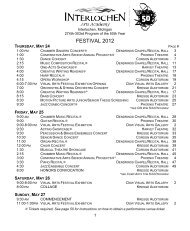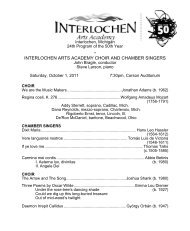2012-13 Academy Student Handbook.pdf - Interlochen Arts ...
2012-13 Academy Student Handbook.pdf - Interlochen Arts ...
2012-13 Academy Student Handbook.pdf - Interlochen Arts ...
You also want an ePaper? Increase the reach of your titles
YUMPU automatically turns print PDFs into web optimized ePapers that Google loves.
tobacco violation. State law, state and local fire codes, and our wooded environment, as well as detrimental physical<br />
effects to the user and those exposed to its use, mean there is no safe or legitimate place for students to smoke at<br />
the <strong>Academy</strong>. The first tobacco/smoking violation will result in a one-week on-campus suspension. A second tobacco/<br />
smoking violation will result in a one-week off-campus suspension. Further violations will be grounds for expulsion.<br />
Because of the fire risk involved, evidence of smoking or burning any substance in the residence hall will result in an<br />
off-campus suspension for the first offense (Open Flame Violation). (Illegal substances are treated below)<br />
Alcohol: Purchase, possession, transfer, use, or evidence of use of alcohol will result in suspension or expulsion for<br />
the first offense and expulsion for any additional offense. Possession of empty alcohol bottles and cans is not allowed<br />
and will be considered an Alcohol Violation. Smelling of alcohol or associating with others while they are using<br />
alcohol will also be considered an Alcohol Violation. As a condition of reinstatement, students suspended for an<br />
alcohol violation are required to undergo a drug and alcohol assessment, attend counseling sessions and submit to<br />
periodic testing. The cost for these services shall be the responsibility of the student's parents. The transfer or sale of<br />
alcohol to other students will be grounds for expulsion.<br />
Other substances: Misuse, abuse or evidence of use of prescribed medications, over-the-counter drugs, aerosol<br />
products or inhalants (“huffing”), other substances used as an hallucinogenic or for the purpose of getting high,<br />
including the transfer or sale of such materials, or associating with others while they are involved with these activities<br />
is strictly prohibited. Disciplinary action up to and including expulsion will result. If the student is allowed to remain<br />
enrolled, drug assessment, counseling and periodic testing, each at the expense of the student's parents, may also<br />
be required.<br />
Illegal drugs and substances: Purchase, possession, use, evidence of use, transfer or sale of drugs, or any drug<br />
related paraphernalia, including but not limited to anabolic steroids, marijuana (including medical marijuana),<br />
synthetic cannabis or other mood altering substances (such as K2, Spice, “herbal incense,” or “herbal smoking<br />
blends”), cocaine, narcotics, LSD, amphetamines or other illegal, un-prescribed drugs or controlled substances, will<br />
result in expulsion. Associating with others while they are involved with illegal drugs or substances will also be cause<br />
for expulsion.<br />
Substance Abuse Intervention: (Also see <strong>Student</strong> Support Policy)<br />
The <strong>Academy</strong> strives to heighten the community's awareness about alcohol/drug abuse and dependency as a<br />
societal problem. Alcohol/drug assessment and testing may be used as a supportive and healthful response to a<br />
student's problems in certain non-disciplinary situations. Behavior and/or concerns indicating possible substance<br />
abuse can be brought to the attention of the licensed professional counselor, school psychologist or health services<br />
nurse prior to the occurrence of a disciplinary incident. On these occasions, personnel from these offices will attempt<br />
to intervene with the student. The process will include parent contact. Approval for assessment and/or testing may be<br />
sought. When used as an intervention tool, the results of testing and assessment are used to determine the need for<br />
further assistance rather than disciplinary consequences. Assistance may include leaving campus for extended<br />
treatment. (See “Medical/Emotional or <strong>Academy</strong> Mandated Leave Policy”)<br />
Referrals to specialists in the Traverse City area are handled through the licensed professional counselor or<br />
psychologist. Support groups may be available periodically on campus. Self-help groups, such as Alcoholics<br />
Anonymous, are available in Traverse City for recovering students. <strong>Student</strong>s with questions and concerns regarding<br />
alcohol/drug use should feel free to discuss them in confidence with members of the health services staff or the<br />
licensed professional counselor or psychologist.<br />
However, it is important to distinguish between students who are caught or confronted in violation of our<br />
Substance Abuse Policy and students who seek help voluntarily. <strong>Student</strong>s caught violating school policies<br />
will face disciplinary action up to and including expulsion. Counseling or medical intervention is only<br />
possible when information becomes known to <strong>Academy</strong> personnel voluntarily and before there is a<br />
disciplinary incident. (See “Level 4 Infractions”)<br />
DISCIPLINARY INFRACTIONS AND CONSEQUENCES:<br />
The purpose of <strong>Interlochen</strong>'s discipline system is to support the policies of the <strong>Academy</strong> and to set the tone for<br />
acceptable and appropriate behavior. Consequences are normally assigned on an individual basis after consideration<br />
of the nature of the infraction, the student's attitude toward the infraction, and the accumulation of infractions<br />
exhibited in the student's past behavior during each school year. The <strong>Academy</strong>’s process is designed to address<br />
behavior, while providing clear consequences. Our goal is to foster the personal development of our students by<br />
addressing behavior and providing an opportunity to learn from choices.<br />
Infractions are divided into four groups that reflect the severity of the infraction. Infractions range from Level 1 to<br />
Level 4, with Level 4 representing those that are most serious.<br />
- COMMUNITY STANDARDS, REGULATIONS AND GUIDELINES - 41


